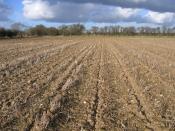Introduction
The ability of soil to sustain a plant's growth is attributed to a number of different factors such as level of compaction, nutrient storage as well as air and water penetration. Each of these factors affect the overall health and growth rate of the plant with soil compaction limiting the advance of roots through the soil column, as well as decreasing the soil porosity.
Soil compaction is one of the main reasons which limit a plants uptake of vital nutrients like potassium, phosphorous and zinc, which are usually absorbed through the roots or root hairs of the plant. If the soil is compacted and the roots are not able to travel far enough outward from the main body of the plant to acquire a healthy level of immobile nutrients the plants health is undermined.
Objectives
This experiment seeks to display the effects of soil compaction on the nutrient uptake of plants, the interaction between physical and chemical fertility within soils and determine the impacts of each on the overall health and growth ability of the plant.
Methods
Outlined in the experimental manual refer to pages 1.1-1.3.
Results
The bulk density for B2P1A was reasonably higher then the other groups within this laboratory session. As was our overall moisture content with a value of 32.9%. This allowed for a final dry density of 1483.370. It was these factors that contributed to the samples within the B2P1 class to have the second highest overall dry density average and the highest bulk density average with a value of 1664.815. The sample group with the highest moisture content was B2P2 with 35.067%, this can be attributed to the sample B2P2A who's bulk density moisture content and dry density was the highest value over the whole sample sector. The values within some samples were...


